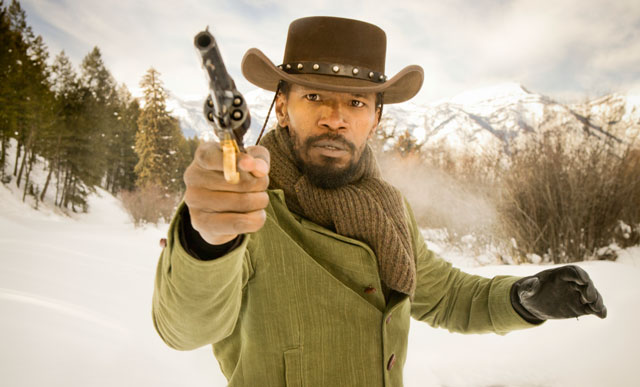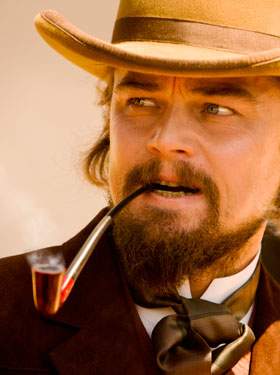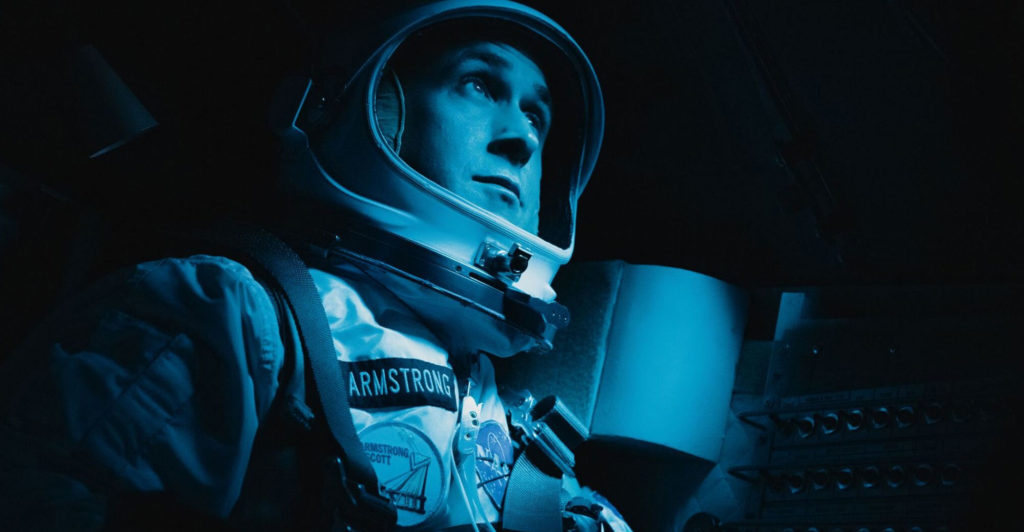
Can a genre film make a serious point? Quentin Tarantino thinks so and he doesn’t care if anyone disagrees. His latest film, Django Unchained, is a taboo-smashing exercise in excess that entertains for nearly every minute of its running time, besides those where it shocks and appals. It is a film designed to be exciting and amusing; am I have giving Tarantino too much credit in thinking that it is also meant to discomfort?
The film is a heady brew of two of the most politically charged popular film forms, “blaxploitation” flicks and spaghetti Westerns. Following in the bloodied footprints of a sleazy exploitation film called Mandingo as well as Sergio Corbucci’s brutal Django, Django Unchained is a revenge film that takes great delight in its transgressions against good taste.
Set just before the American Civil War — rather than a few years after like most Westerns — Django Unchained introduces us to German dentist-turned-bounty hunter Dr King Schultz (Christoph Waltz), who rescues a slave called Django (Jamie Foxx) from a chain gang.
Schultz promises Django freedom and help rescuing his wife from plantation owner Calvin Candie (Leonardo DiCaprio) in exchange for his aid in identifying some nasty varmints. Schultz takes a shine to young Django and mentors him as a bounty hunter, and the pair racks up quite the body count on their way to Candyland to confront Candie.
Slavery is a controversial topic to take on in an action film, and I get Spike Lee’s outrage about such a serious subject being tapped for a mere spaghetti Western. But I think he’s wrong, since Tarantino does make not light of the history. There is nothing flippant about the way that Tarantino handles the violence, degradation and oppression of slavery — things that a more tasteful director may have airbrushed out of the picture.
Many viewers will find those scenes difficult to stomach. I certainly did. But then, there are the scenes of sheer cool where the violence of the oppressor is turned back at him by Foxx as an African American answer to the Man with No Name, scenes that are played for gasps, laughs and kicks. Like Inglourious Basterds, Django Unchained is a film that seems to question and subvert genre at every step, turning the viewer’s gaze back on him as he exhilarates in the carnage.

At one level, it’s spaghetti Western with its tawdry pleasures of six-gun shootouts, bar brawls and Ennio Morricone — though one that slips into fairy-tale logic at times and that sets its much of its action to a glorious funk, hip-hop and country soundtrack.
At another, it’s a film that raises hard questions about history and how it is represented, race, the violence within humanity, the meaning of archetypes and stories. Tarantino has no answers, but he asks the questions in such a provocative way that few people who see the film will not know where they stand.
Tarantino’s casting is, as always, spot on. DiCaprio has a ball as Candie, a leering Southern dandy with a smile full of rotten teeth and middle-aged decadence. Samuel L Jackson, meanwhile, brings to life the most controversial character of the film: Candie’s right-hand man, a cruel, stooped Uncle Tom with mad staring eyes and white hair standing on end like he was struck by lightning.
Foxx brings a bearing of quiet strength to Django, a sense of silent calculation and flinty resolve. But once again a Tarantino film belongs to German actor Waltz, who won the best supporting actor Oscar for Basterds and who is nominated in the same category for Django Unchained.
His dapper, verbose Schultz is the perfect foil for the stony Django. Waltz luxuriates in Tarantino’s loquacious writing, rolling each clearly enunciated word off his tongue with obvious pleasure. Who can blame him? There are few auteurs around with Tarantino’s gift for stylised, quotable dialogue and he is on form in Django Unchained.
As a whole, Django Unchained is perhaps not the best work in Tarantino’s filmography, though, like Inglourious Basterds, its stature may grow with repeated viewings. There are passages in the third act that drag on a little, a sense that the film could’ve done with tighter editing. This is Tarantino’s first film without the late Sally Menke at his side, and her deft hand at the editor’s desk is definitely missed.
Django Unchained official trailer:
Django Unchained borrows the title theme from Corbucci’s Django:
But despite that, Django Unchained has enough standout scenes that rank among the director’s best to elevate it to a classic in waiting. There’s one scene featuring some gormless proto-Klansmen that is probably the funniest thing Tarantino has written since the “Why am I Mr Pink?” bit in Reservoir Dogs. And there are moments of comical violence as startling as the first time you saw Vincent accidentally blow poor Marvin’s head off in Pulp Fiction.
Django Unchained is funny, thrilling, beautifully shot by Oscar-nominated cinematographer Robert Richardson, and thoroughly tasty and tasteless all at the same time. Designed to deliver a sharp kick to the liberal sensibilities, Django Unchained is the sort of film that probably only Tarantino could get away with making. — (c) 2013 NewsCentral Media
Read more:
- Can an exploitation movie be a great movie?
- Roger Ebert on Django Unchained: Faster, Quentin! Thrill! Thrill!
- Setting Tarantino free




